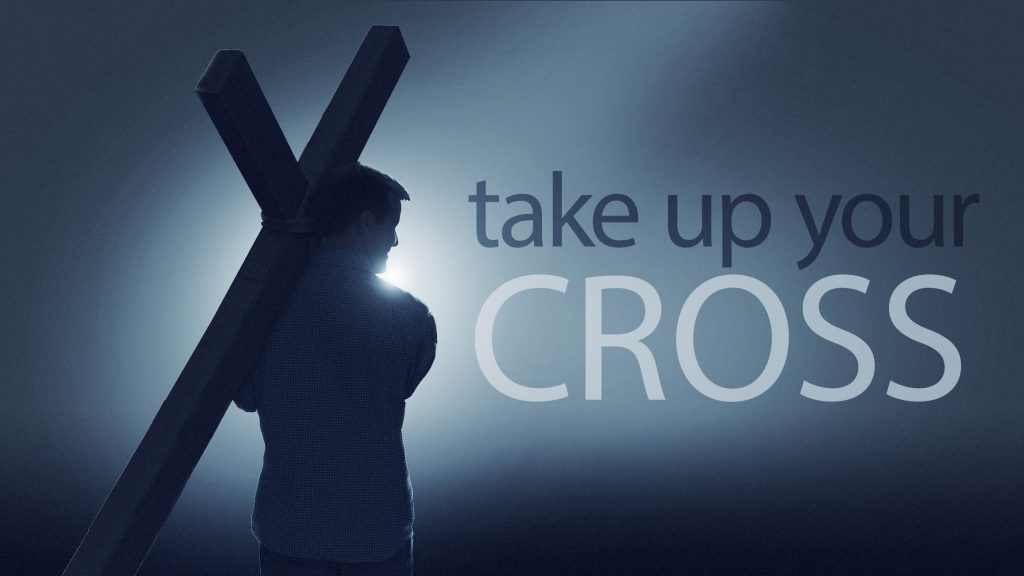Jesus said that any followers of His must bear several clear and distinctive marks: abiding in the words of Jesus (John 8:31-32), loving other followers of Jesus (John 13:34-35), and bearing fruit for Jesus (John 15:5-8). Most challenging of all, Jesus says, “If anyone would come after me, let him deny himself and take up his cross daily and follow me” (Luke 9:23). Observe carefully: followers of Jesus are cross-carriers.
But what is a “cross?” And what does it mean to “take up your cross?” In the context of Jesus’s challenge, a person’s “cross” to bear is a burden accepted for the sake of doing the will of God. Notice that following Jesus involves a burden because discipleship is both costly and challenging (Luke 14:25-33; cf. Matt. 11:28-30). Notice as well that the burden must be freely accepted by the one who would follow Jesus. The life of discipleship is not compulsory, but is motivated by a desire to experience the joy that can only be found in knowing God (Ps. 16:11; Phil. 4:4). Finally, notice that the “cross” Jesus spoke about is suffering accepted for the sake of doingGod’s will. Peter further explains this concept: “But let none of you suffer as a murderer or a thief or an evildoer or as a meddler. Yet if anyone suffers as a Christian, let him not be ashamed, but let him glorify God in that name” (1 Pet. 4:15- 16). So, taking up one’s cross has to do with freely and voluntarily accepting the burdens that result from doing God’s will.
Consider three broad areas in which every disciple of Jesus will find a cross to bear:
Association with Jesus – Many in the world have always hated Jesus because, as John says, the darkness hates light (John 3:19-20). Thus, it is frequently dangerous or difficult to be associated with Him. During His ministry, many would not confess Jesus because they were afraid of being excommuni- cated from the synagogue (John 12:42-43). During His trial, Peter denied Jesus (i.e. he refused to be associated with the Lord) three times (Matt. 26:69-75). Even the curious Nicode- mus came to see Jesus by night (John 3:2). On one occasion Jesus said, “So everyone who acknowledges me before men, I also will acknowledge before my Father who is in heaven, but whoever denies me before men, I also will deny before my Father who is in heaven” (Matt. 10:32-33). At times, the cross that we must bear is being willing to suffer the consequences of association with Him.
Obedience to Jesus – The rich young ruler was chal- lenged with a “cross” to obey the Lord: “Go, sell all that you have and give to the poor, and you will have treasure in heaven; and come, follow me” (Mark 10:21). Obedience is a proof of our love for Jesus (John 14:15), and genuine love is always costly. When we obey the commands of our Lord, the world will think it strange (1 Pet. 4:3-4) and will often mock and ridicule the children of God (1 Pet. 4:14-16; 2 Tim. 3:12). However, Scripture reminds us that Jesus Himself, “learned obedience by the things that He suffered” (Heb. 5:8). Obedience often comes at the cost of personal suffering. Rememberthe words of David, “I will not offer burnt offerings to the Lord my God that cost me nothing” (2 Sam. 24:24). Obedience is costly; it is often a cross to be carried.
Imitation of Jesus – Discipleship means that we follow Jesus, and He points out the inevitable result of doing so: “It is enough for the disciple to be like his teacher, and the servant like his master…” (Matt. 10:25a). And again, “A disciple is not above his teacher, but everyone when he is fully trained will be like his teacher” (Luke 6:40). True discipleship always involves imitation of Jesus, our Great Example (1 Pet. 2:21- 22). As we sincerely seek to have the mind of Christ (Phil. 2:5), our selfish wills and ways must be put to death. Real discipleship is a daily walk to greater Christ-likeness (Gal. 4:19; 2 Pet. 3:18).
May God help us to think seriously about what it means to take up our crosses and follow Him.
-John Baker
